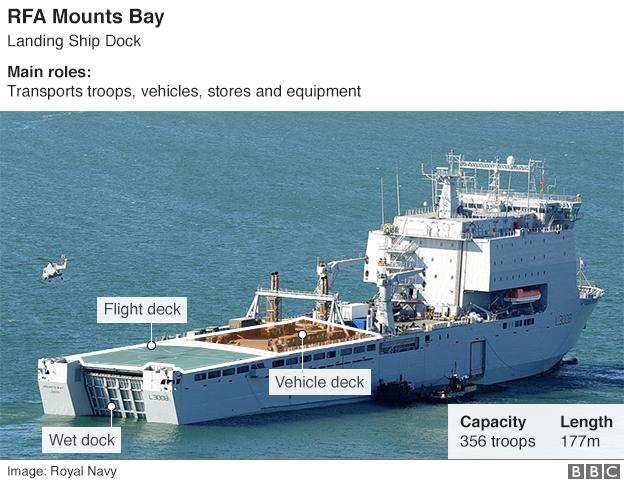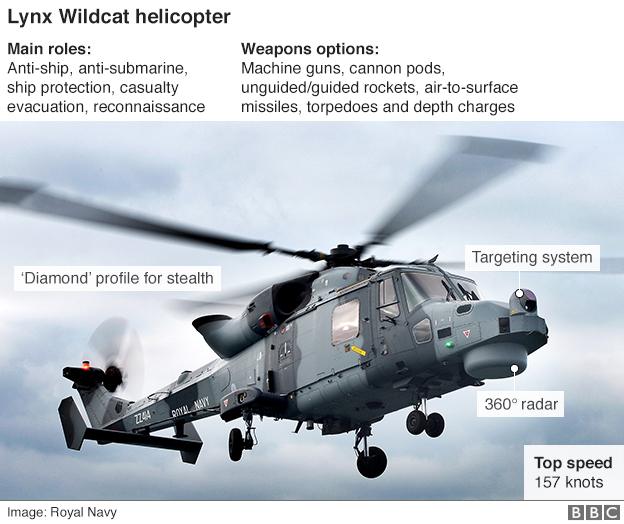Migrant crisis: UK to send ships to tackle people smugglers
- Published
- comments
David Cameron addresses reporters on way in to emergency EU summit on migration crisis
The UK will provide "vital military assets" to help a Nato mission tackling people smugglers in the Aegean Sea, David Cameron has said.
The PM said the amphibious landing ship RFA Mounts Bay would be sent, ahead of an emergency EU summit in Brussels.
The ship, which carries a Wildcat helicopter, will be working alongside three UK Border Force boats.
More than a million migrants entered the EU illegally by boat travelling mainly from Turkey to Greece last year.
RFA Mounts Bay and two Border Force patrol boats, known as cutters, will join naval vessels from Germany, Canada, Turkey and Greece as part of Nato's first intervention in the migrant crisis.
The vessels will identify smugglers taking migrants to Greece and pass the information to the Turkish coastguard so it can intercept the boats and take the migrants back to Turkey.
The EU has pledged €3bn (£2.3bn; $3.3bn) to Turkey in return for housing migrants and stemming the flow.
Some 13,000 are stranded on Greece's border with Macedonia as European states seek to restrict entry.
RFA Mounts Bay would begin the operation in the "coming days", the cutter Protector was on its way to the region and a further cutter was expected to join them later this month, the government said, external.
Another Border Force boat, VOS Grace, is already in the Aegean Sea, between Greece and Turkey.
Crisis explained in seven charts


RFA Mounts Bay is part of the Royal Fleet Auxiliary, a civilian-manned organisation which provides logistical and operational support for tasks undertaken by the Royal Navy, including counter-piracy measures and humanitarian and disaster relief
The ship is a 16,000-tonne vessel with a standard crew of 356, top speed of 18 knots (21 mph) and range of 8,000 nautical miles. The range is the total distance it is capable of covering without taking on fresh fuel
It is an amphibious ship with the capability of launching landing craft and amphibious vehicles
The Wildcat helicopter the ship carries is from 825 Naval Air Squadron

'Desperate flow'
Mr Cameron said the Nato mission was important as it aimed to "break the business model of the criminal smugglers" and "stop the desperate flow of people crammed into makeshift vessels".
"It's an opportunity to stop the smugglers and send out a clear message to migrants contemplating journeys to Europe that they will be turned back," he said.
On his arrival at the summit, Mr Cameron said the UK's opt-out from the Schengen agreement meant there was "no prospect" of Britain joining any new EU asylum system.
"Even outside the EU, we'd be affected by a migration crisis like this," he said.
"But at the end of the day, we maintain our borders in our own way of doing things, because we have the best of both worlds."
BBC correspondents describe the scene at pressure points of the crisis
The Royal Navy already has HMS Enterprise deployed in the Mediterranean with two UK Border Force cutters as part of the EU Naval Force Operation countering migrant smugglers.
Defence Secretary Michael Fallon told the Commons that HMS Enterprise had rescued about 100 migrants trying to reach Italy from North Africa on Sunday.
Liberal Democrat former minister Alistair Carmichael warned that more people had died on the sea route from Libya to Italy than in the Aegean Sea, as he questioned how the new operation in the Aegean would affect resources in the region.
Syria crisis
Mr Fallon accused Russia of deliberately fuelling the refugee crisis by bombing Syrian civilians in order to force them to flee towards Europe.
He said he agreed with the comments made by Nato's top commander in Europe, Gen Philip Breedlove, who accused Russia last week of "weaponising" the migrant crisis in order to destabilise Europe and "to overwhelm European structures and break European resolve".
"The bombing that they [Russia] have carried out in Syria seems designed to push the Syrian civilian population toward the Turkish border and then on from Turkey into Greece," he said.
The UK and US governments have repeatedly criticised Russian air strikes, which they say have often targeted moderate opponents of the Syrian government rather than the Islamic State militant group.
A temporary ceasefire in Syria was agreed last week, which Western leaders hope may ease the flow of refugees to Europe.
In the run-up to the ceasefire Russia was accused of deliberately hitting hospitals and civilian infrastructure.
Russia has insisted that it attacks only "terrorist" targets.


